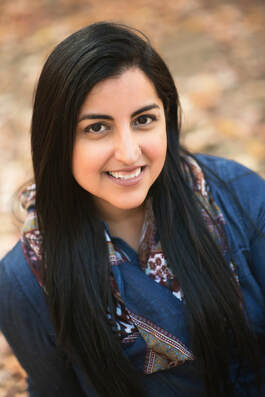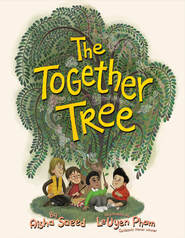|
Hello and Salaam, Aisha! I am so excited to be interviewing you today for KidLit in Color's blog. I'm sure many are familiar with you and your work, but can you briefly tell our readers a little about yourself and your books: Walaikumsalaam, Aya! I’m delighted to connect with you. I write books for young people of all ages including Amal Unbound, and Bilal Cooks Daal. I’m also a proud founding member of the nonprofit We Need Diverse Books. I absolutely loved your picture book Bilal Cooks Daal (fun fact, I used it as a comp for my picture book, The Night Before Eid). The Together Tree is definitely a bit more different and more serious. I know you touch on it a little in your backmatter, but can you tell readers why you wrote it? I’m delighted to hear that Bilal Cooks Daal was a comp for The Night Before Eid! My picture books are inspired by my children and our lived experiences. Bilal Cooks Daal was inspired by my middle son who was surprised when no one in his preschool knew what daal was. The Together Tree is also a story inspired by one of my children though his situation was considerably more challenging. During his first week of kindergarten, my eldest son was bullied by his peers. The Together Tree explores what it is to experience bullying, and importantly, what someone can do if they happen to be a bystander to help the person who needs such help. In addition to being a story about the power of bystanders, The Together Tree is also a tale about the power of imagination to build community.
The Together Tree also reminded me of my debut picture book, The Arabic Quilt, in terms of getting bullied for the way they look or speak. In both books, the "mean kid" feels bad for what they did and is apologetic. I've heard some conflicting points of view about this. Why did you think it was important that the mean kid apologize to Rumi for his actions in The Together Tree? That’s a great question! I think that both situations (where a bully does not apologize or learn, and where a bully does mend their ways) are realistic and happen every single day. I love Jacqueline Woodson’s picture book Each Kindness which examines how sometimes we don’t get to make amends with those we’ve hurt. Stories like those are very important. I chose to write a story about reconciliation in part because the children in The Together Tree are very young and because while it is a story about many things, it’s also a story about the power of forgiveness. We might make mistakes. We might do the wrong thing. But we always have the choice to rectify, and get back on track. Do you have any tips for aspiring authors or new authors? I often get asked where I get my story ideas from. As I shared in one of my earlier answers, much of what I write is inspired by my own lived experiences. So often we discount our own lives as sources for stories, but there is so much that can be examined and explored. One should never discount the power of ones own lived stories! What did you think of the illustrations, do you have a favorite spread? LeUyen Pham is one of my absolute favorite illustrators. When we began to consider who might illustrate this book, she was my dream partner for this project. I am so grateful for her insights and creativity that brough the story to life. My favorite spread is further into the story, when Asher—the bully—does an unthinkable act of cruelty. LeUyen captures the emotion of that moment for both the bully and Rumi, the child who is being bullied, so vividly through her use of color and lack thereof. It is a profound spread. What's the biggest takeaway you want for readers to have after they finish reading this book? It is my dream that this story can be part of first week of school activities in order to build community and foster a warm learning environment. I’m delighted to hear that Bilal Cooks Daal was a comp for The Night Before Eid! My picture books are inspired by my children and our lived experiences. Bilal Cooks Daal was inspired by my middle son who was surprised when no one in his preschool knew what daal was. The Together Tree is also a story inspired by one of my children though his situation was considerably more challenging. During his first week of kindergarten, my eldest son was bullied by his peers. The Together Tree explores what it is to experience bullying, and importantly, what someone can do if they happen to be a bystander to help the person who needs such help. In addition to being a story about the power of bystanders, The Together Tree is also a tale about the power of imagination to build community. The Together Tree also reminded me of my debut picture book, The Arabic Quilt, in terms of getting bullied for the way they look or speak. In both books, the "mean kid" feels bad for what they did and is apologetic. I've heard some conflicting points of view about this. Why did you think it was important that the mean kid apologize to Rumi for his actions in The Together Tree? That’s a great question! I think that both situations (where a bully does not apologize or learn, and where a bully does mend their ways) are realistic and happen every single day. I love Jacqueline Woodson’s picture book Each Kindness which examines how sometimes we don’t get to make amends with those we’ve hurt. Stories like those are very important. I chose to write a story about reconciliation in part because the children in The Together Tree are very young and because while it is a story about many things, it’s also a story about the power of forgiveness. We might make mistakes. We might do the wrong thing. But we always have the choice to rectify, and get back on track. Do you have any tips for aspiring authors or new authors? I often get asked where I get my story ideas from. As I shared in one of my earlier answers, much of what I write is inspired by my own lived experiences. So often we discount our own lives as sources for stories, but there is so much that can be examined and explored. One should never discount the power of ones own lived stories! What did you think of the illustrations, do you have a favorite spread? LeUyen Pham is one of my absolute favorite illustrators. When we began to consider who might illustrate this book, she was my dream partner for this project. I am so grateful for her insights and creativity that brough the story to life. My favorite spread is further into the story, when Asher—the bully—does an unthinkable act of cruelty. LeUyen captures the emotion of that moment for both the bully and Rumi, the child who is being bullied, so vividly through her use of color and lack thereof. It is a profound spread. What's the biggest takeaway you want for readers to have after they finish reading this book? It is my dream that this story can be part of first week of school activities in order to build community and foster a warm learning environment. Aisha Saeed is the author of Written in the Stars, which was listed as a Best Book of 2015 by Bank Street Books, a 2016 YALSA Quick Pick for Reluctant Readers, and named one of the Top Ten Books All Young Georgians Should Read in 2016. She is also the author of the middle grade novel Amal Unbound, which has received starred reviews from Publishers Weekly and Kirkus Reviews and is a Global Read Aloud for 2018. Her other picture books include Bilal Cooks Daal and The Together Tree. Aisha is a founding member of the nonprofit We Need Diverse Books. She has been featured on MTV, HuffPost, NBC, and the BBC, and her writings have appeared in publications including the journal ALAN and the Orlando Sentinel. Comments are closed.
|
Archives
July 2024
Categories
All
|


 RSS Feed
RSS Feed



